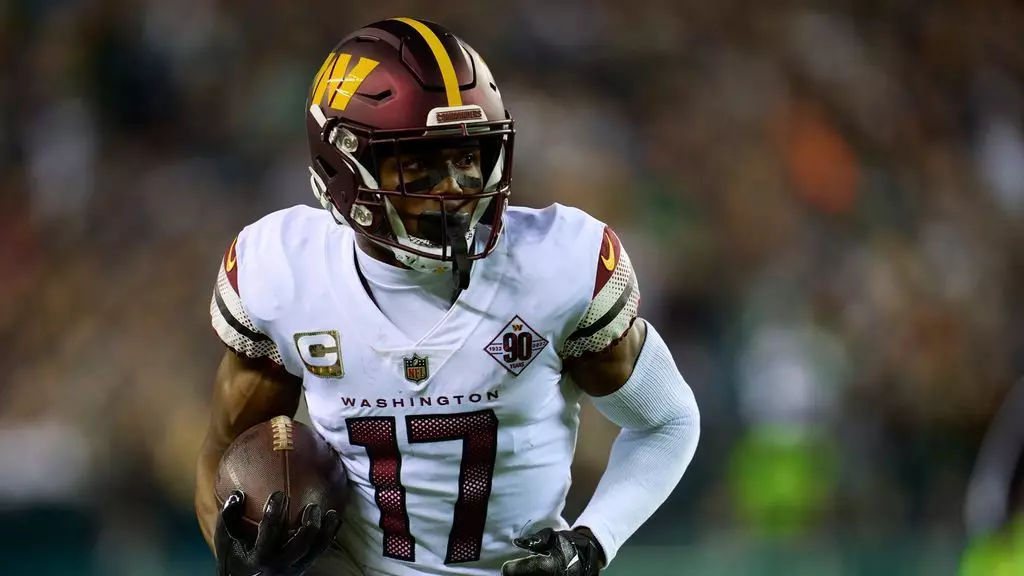In the modern NFL landscape, the expectations and realities of player management are changing rapidly, often at the expense of team cohesion and stability. The case of Terry McLaurin’s trade request exemplifies a troubling trend — one where player power and contractual disputes threaten to overshadow the fundamental spirit of team sport. While football is, undeniably, a business, the manner in which these negotiations unfold reveals a disturbing shift in priorities. It’s not just about contract dollars anymore; it’s about a delicate balance of loyalty, morale, and the perception of fairness. When a franchise’s star receiver publicly requests a trade amid simmering contract negotiations, it signals a form of player activism that can fracture locker rooms and undermine the trust necessary to foster a winning environment.
The Illusion of Business as Usual
Washington’s coaching staff, led by Dan Quinn, attempts to dismiss McLaurin’s move as “normal business.” This reframing glosses over the deeper issues at play. Labels like “business as usual” serve to normalize a disturbing behavior that can breed cynicism. When players view their roles solely through the lens of contract negotiations and perceived undervaluation, their emotional investment in the team diminishes. The NFL’s depiction as a cutthroat enterprise fosters a mentality where players feel compelled to leverage their market value, often at the expense of team stability. Such a mindset is especially damaging when it involves core players like McLaurin, whose presence is vital both on and off the field. An injured or sidelined player, even one rehabbing an ankle, maintains profound importance to the team’s identity. To dismiss their trade requests as just part of “normal business” risks overlooking the human element that underpins every team.
Leadership’s Attempt to Manage the Unmanageable
Coaches like Quinn try to portray a calm, pragmatic stance — claiming they don’t need to address or mediate these internal conflicts directly. Yet, this approach is superficial, as it underestimates the intrinsic volatility that such requests bring to team chemistry. Ignoring or downplaying player dissatisfaction only invites more unrest. When players see their concerns dismissed or minimized, it fosters resentment and erodes the trust between the roster and management. For an organization striving for a cohesive locker room, the reality is far more complex than simple statements about “focusing on football.” There’s a growing disconnect between what players expect in terms of market value and what teams are willing to offer, especially as the NFL’s economic landscape evolves. McLaurin’s case highlights a widening chasm that some might argue is symptomatic of a league increasingly driven by individual brands and financial self-interest rather than collective team success.
Value, Loyalty, and the Cost of Rising Expectations
McLaurin’s contract scenario points to a broader issue — the pressure for players to secure financial security before their careers decline. His negotiations mirror the rising expectations of athletes wanting to be compensated according to their production and potential. However, the NFL’s structure often deprives players of long-term security, pushing them into these high-stakes negotiations during their prime years. McLaurin, approaching 30, is battling this stark reality — a stark contrast to the league’s traditional view of aging receivers as no longer valuable. The pushback from Washington, reluctant to pay top dollar to an aging star, reveals a wider reluctance to challenge economic norms that favor teams over players. Yet, this stance is short-sighted. It undermines the very loyalty and passion players bring, which in turn diminishes the sport’s appeal for fans craving authentic, heartfelt competition.
The Human Cost of Business Decisions
What often gets lost in these debates is the human face of football — individuals like McLaurin whose personal aspirations, family security, and identity are intertwined with their careers. His dedication to the team, evidenced by his performance and leadership, is profound. His injury setbacks, his dedication in rehabilitation, and his interaction with fans — these paint a picture of a player committed beyond mere statistics. His trade request, in this context, should be seen as an act of frustration and a plea for recognition, not merely a negotiating tactic. When teams brush aside such requests as “business,” it trivializes the emotional toll on players. It signals an environment where success is measured solely in dollars and wins, neglecting the profound human element that keeps the game alive and relatable. League institutions need to reflect on the damage wrought when contractual disputes overshadow the core values of sportsmanship, loyalty, and respect.


Leave a Reply